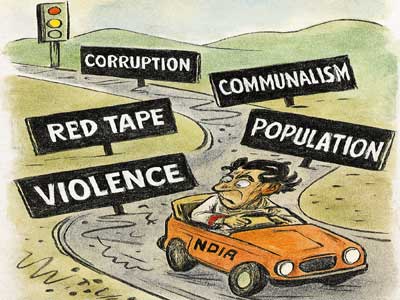Welcome to India, where mornings no longer greet you with birdsong but with a full-blown orchestra of honking horns, brawling bus drivers, and political soundbites.
Here, discipline is not absent; it’s extinct. Rules are museum pieces, framed neatly on paper, while ‘chalta hai’ has become the unofficial national anthem. The real question is, will this circus ever end, or are we doomed to perform forever under the big top of chaos?
Take a government school classroom. The bell rings, but the teacher doesn’t. After half an hour, chalk flies like arrows, paper rockets become guided missiles, and the girls scream while the boys laugh like they’ve invented comedy. The headmaster storms in, scolds, leaves—and order collapses again within seconds. When the teacher finally arrives, she takes attendance and disappears like Houdini. Lesson of the day? Students learn that time, rules, and responsibility are all optional.
Step into a government office, and you enter a black hole of productivity. Doors open at 10 am, but if work starts by 11, it’s a national miracle. Karnataka even boasts the legendary ‘banana break’ at 11 sharp, because why bother with files when fruit is waiting? Across India, governance is less about serving the people and more about perfecting the art of creative delay.
Retired teacher Meera nails it, “Whether it’s roads, hospitals, courts, or even Parliament, the pride of democracy, discipline is missing in action. Queues are broken, rules exist only in rulebooks, and time is treated like dirt. Indians don’t just bend rules, we worship the shortcut.”
Traffic rules? Oh, those are just pretty signs for decoration. Lane-changing is an extreme sport, red lights are suggestions, and honking is our national language. Pedestrians play Russian roulette with speeding cars, and drivers treat zebra crossings like racing stripes. At railway stations and government counters, queues resemble rugby scrums, every man for himself, until a VIP or bribe blows the whistle.
Ah, Parliament, the sanctum sanctorum of democracy, or so the textbooks claim. Instead of debates, we get screaming matches, microphone-breaking contests, chair-throwing championships, and the occasional fistfight. Bills are not passed; they are wrestled into submission. As Prof Paras Nath Chaudhary says, “This is not democracy’s pride, it’s democracy’s punchline.”
In India, late-latif isn’t an insult; it’s a lifestyle. Arriving late is cool, missing deadlines is fashionable, and breaking promises is a career skill. Collective time wastage is practically a GDP sector. Sprinkle in corruption, where every service has a ‘shortcut fee’, and you’ve got a perfect recipe for national stagnation, garnished with bribes.
Now let’s look at Japan. In schools, kids clean classrooms, share tasks, and learn discipline as naturally as breathing. Responsibility isn’t lectured, it’s lived. That’s why their trains, the Shinkansen, apologise if they’re late by even a minute, while in India, entire lifetimes can pass waiting for a train, a file, or a government scheme.
Japan rose from the ashes of nuclear devastation to economic superpower status. India, with all its resources and talent, still struggles to rise above traffic jams and missing teachers.
The contrast is painful, almost humiliating. Japan turned discipline into prosperity; India turned indiscipline into culture. We have the talent, resources, and ambition, but zero respect for rules. And that single missing ingredient is both our dead weight and our silver bullet.
Unless India decides that rules are meant to be followed, not broken, bent, or bought—our progress will remain what it is today: loud, chaotic, and permanently stuck at a red light.
















Related Items
India’s ‘Unique’ Journey as a Republic…
India rises as a ‘Global Medical Travel Destination’
A social revolution India has been waiting for…